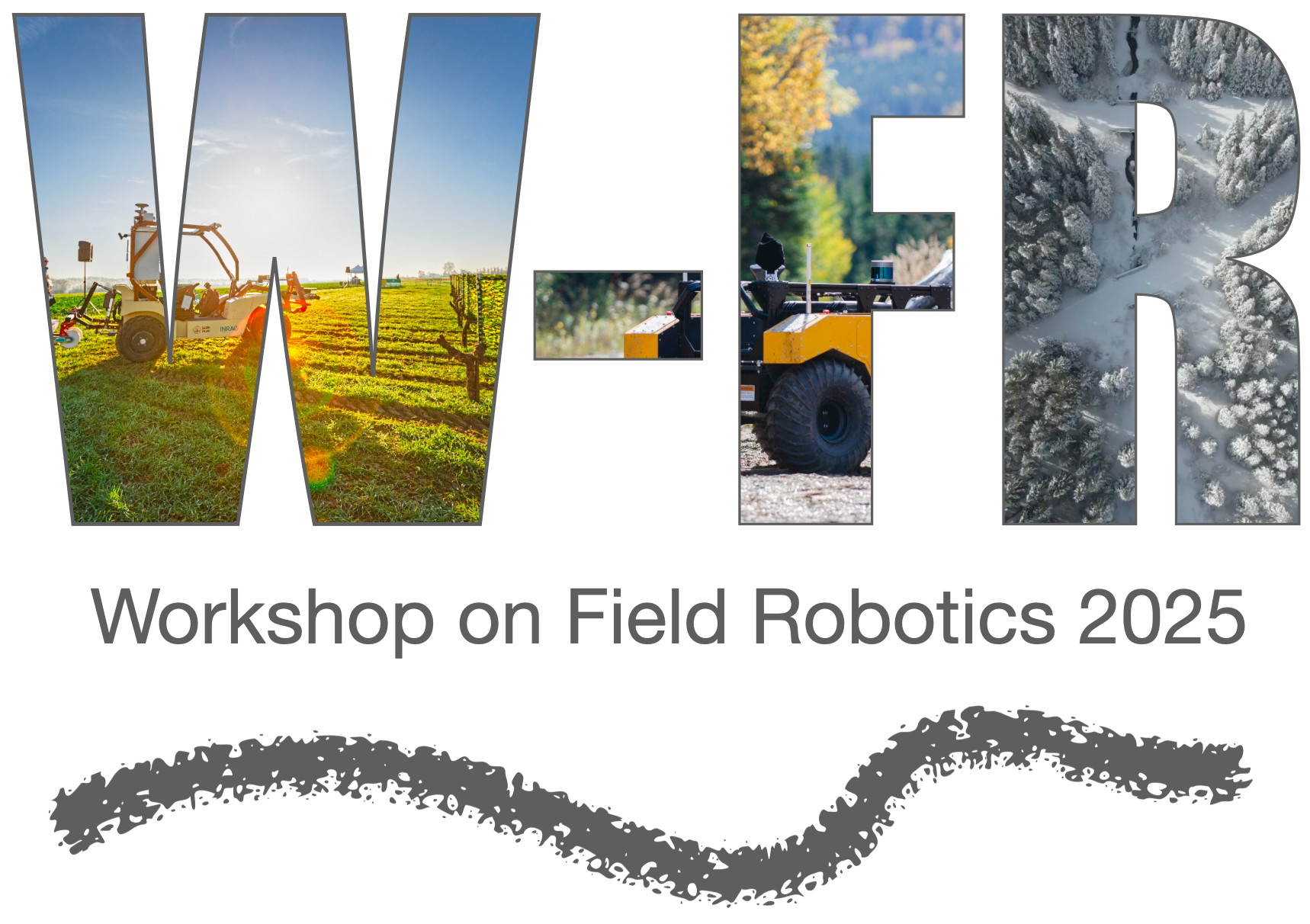30 Years of Robotics for Disasters
Robin MurphyTexas A&M University
Personal website


The workshop on Field Robotics 2025 is over and was a tremendous success! We received many contributions, out of which the presented papers are listed in the following section, high-quality talks, and had estimated the attendance to more than 300 researchers. The workshop was the most crowded room of the day, demonstrating a clear need for field roboticists to gather and share experiences and lessons learned.
| A Concept for Planetary Drilling Autonomy Sarah Boelter, Ebasa Temesgen, Greta Brown, Mario Jerez, Elsa Forberger, Brian Glass, Maria Gini |
| ASAP-MO: Advanced Situational Awareness and Perception for Mission-critical Operations Veronica Vannini, William Dubois, Olivier Gamache, Jean-Michel Fortin, Nicolas Samson, Effie Daum, François Pomerleau, Edith Brotherton |
| AquaticVision: Benchmarking Visual SLAM in Underwater Environment with Events and Frames Yifan Peng, Yuze Hong, Ziyang Hong, Apple Pui-Yi Chui, Junfeng Wu |
| Ariel Explores: Vision-based underwater exploration and inspection via generalist drone-level autonomy Mohit Singh et. al. |
| Automated Deployment Planning for Heterogeneous Robot Teams in Disaster Response Ananya Rao et. al. |
| Autonomous Culvert Inspection on the Erie Canal using Legged Robots Kartikeya Singh et. al. |
| Bringing smart sensing to the forest: on-machine volume estimation for long-log harvesting Maxime Vaidis et. al. |
| CAHSOR: Competence-Aware High-Speed Off-Road Ground Navigation in SE(3) Anuj Pokhrel et. al. |
| CU-Multi: A Dataset for Multi-Robot Data Association Doncey Albin et. al. |
| Crop-Aligned Cutout for Data Augmentation to Learn More Robust Under-Canopy Navigation Robel Mamo et. al. |
| Deploying Foundation Model-Enabled Air and Ground Robots in the Field: Challenges and Opportunities Zachary Ravichandran, Fernando Cladera, Jason Hughes, Varun Murali, M. Ani Hsieh, George J. Pappas, Camillo J. Taylor, Vijay Kumar |
| Deploying SICNav in the Field: Safe and Interactive Crowd Navigation using MPC and Bilevel Optimization Sepehr Samavi, Garvish Bhutani, Florian Shkurti, Angela P. Schoellig |
| Diffusion-Based Image Augmentation for Semantic Segmentation in Outdoor Robotics Peter Mortimer et. al. |
| Do We Still Need to Work on Odometry for Autonomous Driving? Cedric Le Gentil, Daniil Lisus, Timothy D. Barfoot |
| Ecologically-Informed Autonomy in Field Robotics: Toward Nutrient-Driven Informative Sampling Fiorella Sibona et. al. |
| End-to-End Framework for Robot Lawnmower Coverage Path Planning using Cellular Decomposition Nikunj Shah, Utsav Dey, Kenji Nishimiya |
| Enhancing Situational Awareness in Underwater Robotics with Multi-modal Spatial Perception Pushyami Kaveti, Ambjorn Grimsrud Waldum, Hanumant Singh, Martin Ludvigsen |
| Evaluating Robustness of Deep Reinforcement Learning for Autonomous Surface Vehicle Control in Field Tests Luis F. W. Batista, Stéphanie Aravecchia, Seth Hutchinson, Cédric Pradalier |
| Excavation Autonomy with Resilient Traversability and Handling Yash Turkar et. al. |
| Factor-Graph-Based Passive Acoustic Navigation for Decentralized Cooperative Localization Using Bearing Elevation Depth Difference Kalliyan Velasco, Timothy W. McLain, Joshua G. Mangelson |
| Feature Geometry for Stereo Sidescan and Forward-looking Sonar Kalin Norman et. al. |
| Field Report on Ground Penetrating Radar for Localization at the Mars Desert Research Station Anja Sheppard, Katherine A. Skinner |
| From Theory to Practice: Identifying the Optimal Approach for Offset Point Tracking in the Context of Agricultural Robotics Stephane Ngnepiepaye Wembe, Vincent Rousseau, Johann Laconte, Roland Lenain |
| GND: An Outdoor Global Navigation Dataset with Multi-Modal Perception and Traversability Jing Liang et. al. |
| Gaussian Splatting as a Unified Representation for Autonomy in Unstructured Environments Dexter Ong, Yuezhan Tao, Varun Murali, Igor Spasojevic, Vijay Kumar, Pratik Chaudhari |
| Invariant Extended Kalman Filter for Autonomous Surface Vessels with Partial Orientation Measurements Derek Benham, Easton Potokar, Joshua G. Mangelson |
| Learning Rock Pushability on Rough Planetary Terrain Tuba Girgin, Emre Girgin, Cagri Kilic |
| Localized Graph-Based Neural Dynamics Models for Terrain Manipulation Chaoqi Liu et. al. |
| MARIO: Multi-Arm Robot for In-orbit Operations Praveen Elavazhagan et. al. |
| Mapping the Catacombs: An underwater cave segment of the Devil’s System Ioannis Rekleitis et. al. |
| On the Development of a Portable and Cost-Effective Multimodal Imaging System for Underwater Mapping and Monitoring with Remotely Operated Vehicles Giancarlo Troni et. al. |
| Optimizing Indoor Farm Monitoring Efficiency Using UAV: Yield Estimation in a GNSS-Denied Cherry Tomato Greenhouse Hyondong Oh et. al. |
| Physics-Constrained and Vision-Informed Friction Estimation Renukanandan Tumu et. al. |
| QuadWBG: Generalizable Quadrupedal Whole-Body Grasping Jilong Wang, Javokhirbek Rajabov, Chaoyi Xu, Yiming Zheng, He Wang |
| RaSCL: Radar to Satellite Crossview Localization Blerim Abdullai et. al. |
| Reactive Collision Avoidance for Safe Agile Navigation Alessandro Saviolo, Niko Picello, Jeffrey Mao, Rishabh Verma, Giuseppe Loianno |
| Robotics Under Construction: Challenges on Job Sites Haruki Uchiito, Akhilesh Bhat, Koji Kusaka, Xiaoya Zhang, Hiraku Kinjo, Honoka Uehara, Motoki Koyama, Shinji Natsume |
| SKiD-SLAM: Robust, Lightweight, and Distributed Multi-Robot LiDAR SLAM in Resource-Constrained Field Environments Hogyun Kim, Jiwon Choi, Juwon Kim, Geonmo Yang, Dongjin Cho, Hyungtae Lim, Younggun Cho |
| SynthFuseKD: Enhancing Off-Road Semantic Segmentation with Synthetic NIR Generation and Knowledge Distillation Wonjune Kim et. al. |
| T-CBF: Traversability-based Control Barrier Function to Navigate Vertically Challenging Terrain Manas Gupta, Xuesu Xiao |
| TartanGround-FR: A Large-Scale Dataset for Ground Robot Perception and Navigation in Unstructured Environments Manthan Patel et. al. |
| Toward Teach and Repeat Across Seasonal Deep Snow Accumulation Matěj Boxan, Alexander Krawciw, Timothy D. Barfoot, François Pomerleau |
| Towards Autonomous In-situ Soil Sampling and Mapping in Large-Scale Agricultural Environments Thien Hoang Nguyen, Erik Muller, Michael Rubin, Xiaofei Wang, Fiorella Sibona, Salah Sukkarieh |
| Towards Terrain-Aware Task-Driven 3D Scene Graph Generation in Outdoor Environments Chad R Samuelson, Timothy W McLain, Joshua G Mangelson |
| Trajectory Planning and Control for Differentially Flat Fixed-Wing Aerial Systems Luca Morando et. al. |
| Uncertainty Aware Mapping for Vision-Based Underwater Robots Mohit Singh et. al. |
| Verti-Bench: A General and Scalable Off-Road Mobility Benchmark for Vertically Challenging Terrain Tong Xu, Chenhui Pan, Madhan B. Rao, Aniket Datar, Anuj Pokhrel, Yuanjie Lu, Xuesu Xiao |
| VertiSelector: Automatic Curriculum Learning for Wheeled Mobility on Vertically Challenging Terrain Tong Xu, Chenhui Pan, Xuesu Xiao |
| Whole-Body End-Effector Pose Tracking Tifanny Portela, Andrei Cramariuc, Mayank Mittal, Marco Hutter |
The best submissions will be invited to submit a full-length paper in a Special Issue of the IEEE Transactions on Field Robotics.
All invited speakers are confirmed.
| Time | Speaker | Topic/title |
|---|---|---|
| 8:30- 8:50 | Organizers | Welcome and opening remarks |
| 8:50- 9:20 | Gregory Dudek (McGill University) | Invited talk #1 - AI-powered robotics for marine applications. |
| 9:20- 9:40 | Five emerging researchers | Spotlight talks #1 (3 min/pers) |
| 9:40- 10:40 | - | Coffee break and poster session |
| 10:40- 11:10 | Kazuya Yoshida (Tohoku University) | Invited talk #2 - Terrestrial field tests for a modular and heterogeneous AI robot system for lunar exploration |
| 11:10- 11:40 | Marco Hutter (ETH Zurich) | Invited talk #3 - Robot Navigation with Common Sense |
| 11:40- 13:00 | - | Lunch |
| 13:00- 14:00 | Robin Murphy (Texas A&M University) | Keynote - 30 Years of Robotics for Disasters |
| 14:00- 14:30 | Panel | Questions: What is the role of simulation, and data sets in field robotics? Should we keep an annual workshop or create a separate conference? Why do old laboratories stop doing field deployments? |
| 14:30- 14:50 | Five emerging researchers | Spotlight talks #2 (3 min/pers) |
| 14:50- 15:50 | - | Coffee break and poster session |
| 15:50- 16:10 | Organizers | Result announcement for the dataset competition |
| 16:10- 16:40 | Frank Dellaert (Georgia Institute of Technology) | Invited talk #4 - Precision Robotics for Agriculture 2.0 |
| 16:40- 17:10 | Josh Marshall (Queen’s University) | Invited talk #5 - Digging Deep: Robotics for Mining in the 21st Century |
| 17:10- 17:30 | Organizers | Conclusion |
| 18:00- 19:30 | - | ICRA Welcome Reception |
*Note: All times are in the local time zone of ICRA 2025 (Atlanta).






The workshop topics include, but are not limited to:
FR workshop accepts contributions based on the following criteria:
This year, the field robotics workshop features multiple competition tracks designed to address key challenges in field robot deployment. The competition focuses on SLAM and vision-based tasks of 2D and 3D Semantic Segmentation in challenging environments like dense vegetation. Participants have access to extensive datasets, including recordings from wheeled, tracked, and multi-legged robots navigating challenging off-road terrains from the GOOSE and GOOSE-Ex dataset. The SLAM dataset features radar-based perception data for off-road environments and multispectral data for scenarios where passive sensors are crucial.
The top-performing teams are invited to present their results during the workshop poster sessions and receive prizes. The competitions are open to all field robotics researchers and practitioners.
Please visit the competition websites for more details:
Any questions about the competition can be directed at field-robotics-competition-icra-25@googlegroups.com.







 Jan Faigl |
 Gerald Steinbauer-Wagner |
 Miloš Prágr |
 Raphael Hagmanns |
 Miguel Granero |
 Vladimír Kubelka |
 Peter Mortimer |